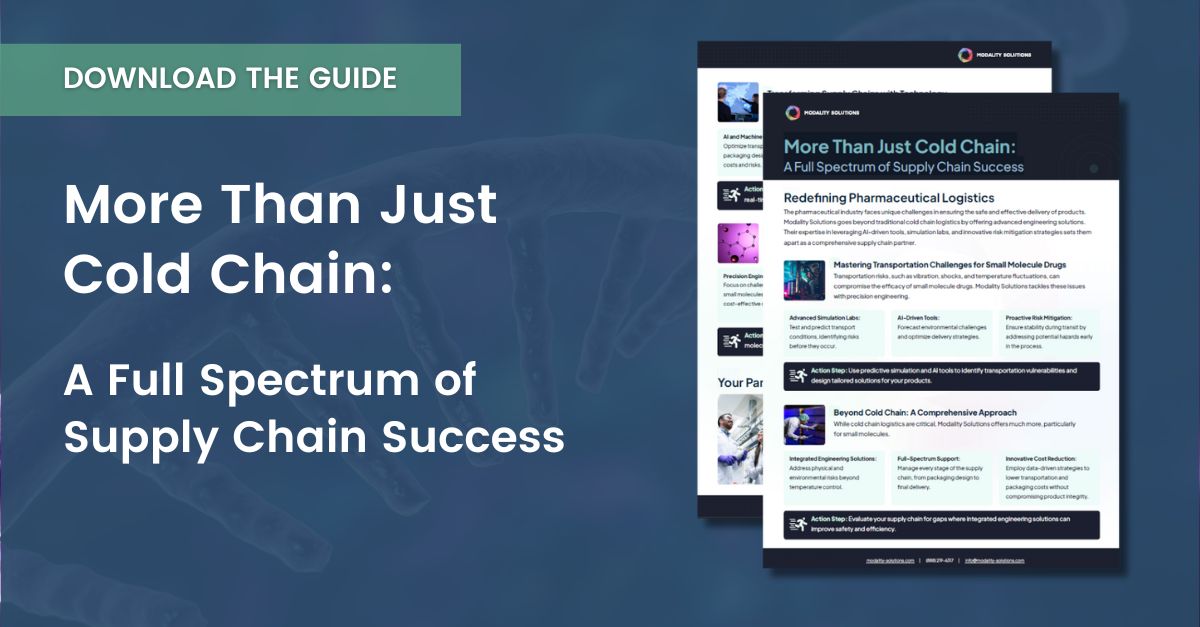More Than Just Cold Chain: A Full Spectrum of Supply Chain Success
Ensuring the safe, effective delivery of small molecule drugs is more challenging than ever....
read Details

Immunotherapies are an increasingly complex set of treatments for a wide variety of diseases and medical conditions. The opportunities for immunotherapy drugs are expanding—but only if the supply chain provides enough stability to keep them safe and effective for patients throughout their journey.
The specific conditions of immunotherapy drugs in transport can present a number of challenges to the supply chain. At Modality Solutions, our experts in global cold chain validation have identified what hazards of immunotherapy drugs pose the greatest risks, and how advanced transport validation can help to mitigate these.
RELATED: Cold Chain Validation Best Practices Including Immunotherapy [WEBINAR]
Two of the more exciting immunotherapies are ADCs (Antibody Drug Conjugates) and CAR-T therapy (Chimeric Antigen Receptor T cell). CAR-T therapies are further divided into autologous (patient specific) and allogeneic (genetically similar but not patient specific) therapies. Because each treatment is individually created for a specific patient, tracking the therapy and patient identity is more important than ever.
Often, specifically for CAR-T cell therapies, the supply chain starts with the patient and ends with the patient. A unique closed loop supply chain has challenges not seen before. With autologous therapy, where collection of patient plasma is the basis for the immunotherapy, a separate blood cell supply chain needs to be established.
Most immunotherapies require deep frozen storage and transportation. Choosing your quality attributes to assess for cryogenic shipping temperatures and selecting the primary and secondary packaging that will keep the integrity of a unique, costly, and often irreplaceable therapy is a major undertaking.
Each of these added challenges demand a solid engineering basis for transport validation.
It is important to ensure that the entire network from patient to processing center to manufacturing to packaging and labeling and finally distribution is clearly defined, and risk assessment is performed throughout.
In order to begin assessing the immunotherapy supply chain for risk, pharmaceutical companies need a robust testing and optimization framework. At Modality Solutions, we call our proprietary testing framework the Hazard and Operability Study (HAZOP) technique, which is tailored for immunotherapy drugs to ensure high risks are identified and mitigated properly.
In a recent HAZOP analysis, Modality Solutions was able to uncover the greatest risks each of the shipping lanes represented to the cell cultures.
One of the findings was around the difficulty in maintaining the required thermal conditions throughout the closed loop supply chain. This was due to deep frozen temperatures required during transport from the patient and collection center to facilities worldwide to perform the genetic reengineering of cells, then efficiently returning the cells to the treatment center, and finally administering it to the right patient for treatment. Once the risks had been identified Modality Solutions moved on to the mitigating phase that included testing the packaging by exposing it to extreme conditions and simultaneous environmental hazards in order to create a risk mitigation plan..
Without the ability to test multiple concurrent environmental hazards at once, pharmaceutical companies face additional challenges in transport validation of the immunotherapy supply chain.
In another HAZOP case study, the FDA requested our client to conduct detailed concurrent traceability and multi-hazard environmental testing on the precursors to the immunotherapy: the monoclonal antibody, linker, and cytotoxin.
Our Advantage Transport Simulation Laboratory™ is able to simulate all major environmental hazards faced in shipping and distribution: shock, vibration, temperature, humidity, and pressure. In our lab, we exposed all products and respective packaging to simulated environmental conditions faced in the shipping lanes. This approach verified the quality of all three precursors after transport and ensured the capability of the packaging and components of the immunotherapy to withstand the environmental hazards faced before reaching the patient.
Several types of immunotherapies treat life-threatening diseases today. All are highly specialized to each patient and require documented collection, prompt storage, deep frozen temperatures, and precision handling, presenting new challenges to the supply chain industry never seen before. It is essential to understand every aspect of this complex supply chain and to build each of these risk components into a comprehensive Validation Master Plan (VMP) to create a robust and repeatable supply chain process with patient safety at its heart.
Along with HAZOP analysis and advanced transport simulation, Modality Solutions also offers help with Validation Master Plans (VMP) and technical documentation as part of our supply chain services to ensure transparency and quality management in the supply chain.
Ensuring the safe, effective delivery of small molecule drugs is more challenging than ever....
read Details
At a Glance: Cold Chain Engineering: Modality Solutions focuses on enhancing drug delivery through...
read Details
In the highly regulated and complex world of biopharmaceutical drug products, ensuring the integrity...
read Details